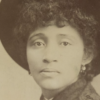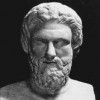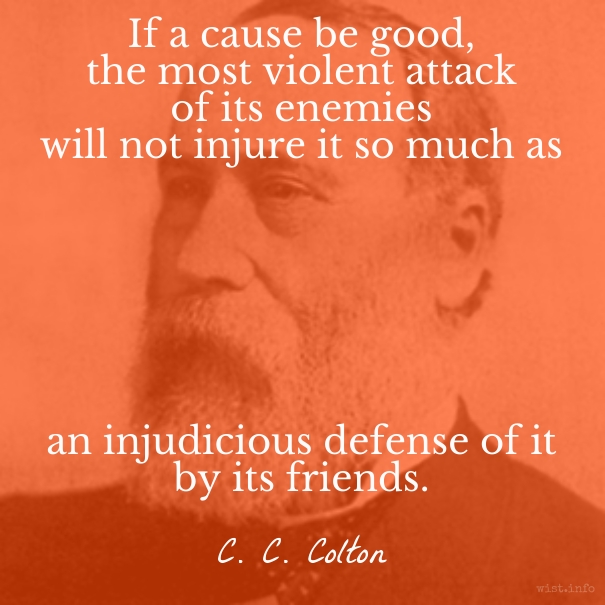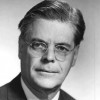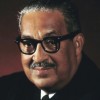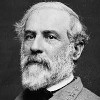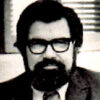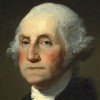If a nation values anything more than freedom, it will lose its freedom; and the irony of it is that if it is comfort or money that it values more, it will lose that too. And when a nation has to fight for its freedom, it can only hope to win if it possesses certain qualities: honesty, courage, loyalty, vision and self-sacrifice. If it does not possess them, it has only itself to blame if it loses its freedom.
Quotations about:
defense
Note not all quotations have been tagged, so Search may find additional quotes on this topic.
We are neither “warmongers” nor “appeasers,” neither “hard” nor “soft.” We are Americans, determined to defend the frontiers of freedom, by an honorable peace if peace is possible, but by arms if arms are used against us. And if we are to move forward in that spirit, we shall need all the calm and thoughtful citizens that this great University can produce, all the light they can shed, all the wisdom they can bring to bear. It is customary, both here and around the world, to regard life in the United States as easy. Our advantages are many. But more than any other people on earth, we bear burdens and accept risks unprecedented in their size and their duration, not for ourselves alone but for all who wish to be free.
John F. Kennedy (1917-1963) US President (1961-63)
Speech, Centennial Celebration, University of Washington, Seattle (1961-11-16)
(Source)
Who knows whether, when a comet shall approach this globe to destroy it, as it often has been and will be destroyed, men will not tear rocks from their foundations by means of steam, and hurl mountains, as the giants are said to have done, against the flaming mass? — and then we shall have traditions of Titans again, and of wars with Heaven.
George Gordon, Lord Byron (1788-1824) English poet
Conversations of Lord Byron with Thomas Medwin, Vol. 2 (1832)
(Source)
The aggressor is always peace-loving (as Bonaparte always claimed to be); he would prefer to take over our country unopposed. To prevent his doing so one must be willing to make war and be prepared for it. In other words it is the weak, those likely to need defense, who should always be armed in order not to be overwhelmed. Thus decrees the art of war.
[Der Eroberer ist immer friedliebend (wie Bonaparte auch stets behauptet hat), er zöge ganz gern ruhig in unseren Staat ein; damit er dies aber nicht könne, darum müssen wir den Krieg wollen und also auch vorbereiten, d. h. mit anderen Worten: es sollen gerade die Schwachen, der Verteidigung Unterworfenen, immer gerüstet sein und nicht überfallen werden; so will es die Kriegskunst.]
Karl von Clausewitz (1780-1831) Prussian soldier, historian, military theorist
On War [Vom Kriege], Book 6, ch. 5 “Character of Strategic Defense [Charakter der strategischen Verteidigung],” (6.5) (1832) [tr. Howard & Paret (1976)]
(Source)
(Source (German)). Alternate translation:A conqueror is always a lover of peace (as Buonaparte always asserted of himself); he would like to make his entry into our state unopposed; in order to prevent this, we must choose war, and therefore also make preparations, that is in other words, it is just the weak, or that side which must defend itself, which should be always armed in order not to be taken by surprise; so it is willed by the art of war.
[tr. Graham (1873)]
Remind them that the sword still hangs upon the wall and the heart still beats within the man, and that that sword will be unsheathed again, if necessary, in defense of your rights. Given them to understand that you will not stand patiently by and see your hard earnings squandered by a luxuriating class of idlers. If the American manhood will arouse itself and speak to those fellows in plain language, not to be misunderstood, they can save themselves, their country and their children, from the fate of poverty which awaits them. Will you do it?
Lucy Parsons (1851-1942) American labor organizer, anarchist, orator [a.k.a. Lucy Gonzalez]
“Wage Slaves vs. Corporations,” The Liberator (24 Sep 1905)
(Source)
They defend their errors as if they were defending their inheritance.
Edmund Burke (1729-1797) Anglo-Irish statesman, orator, philosopher
Speech on Economical Reform, House of Commons (11 Feb 1780)
(Source)
Nothing I accept about myself can be used against me to diminish me.
Audre Lorde (1934-1992) American writer, feminist, civil rights activist
“Eye to Eye: Black Women, Hatred, and Anger,” Sister Outsider: Essays and Speeches (1984)
(Source)
It is absurd to hold that a man ought to be ashamed of being unable to defend himself with his limbs but not of being unable to defend himself with reason when the use of reason is more distinctive of a human being than the use of his limbs.
[πρὸς δὲ τούτοις ἄτοπον εἰ τῷ σώματι μὲν αἰσχρὸν μὴ δύνασθαι βοηθεῖν ἑαυτῷ, λόγῳ δ᾽ οὐκ αἰσχρόν: ὃ μᾶλλον ἴδιόν ἐστιν ἀνθρώπου τῆς τοῦ σώματος χρείας.]
Aristotle (384-322 BC) Greek philosopher
Rhetoric [Ῥητορική; Ars Rhetorica], Book 1, ch. 1, sec. 12 (1.1.12) / 1355b.1 (350 BC) [tr. Roberts (1924)]
(Source)
(Source (Greek)). Alternate translations:Absurd were it, if inability to defend oneself, in the case of the body be disgraceful, but in the case of the reason, which is more peculiarly the characteristic of man than the use of his body, be not disgraceful.
[Source (1847)]It were absurd, if, while it is disgraceful for a man not to be able to assist himself by his person, it were not disgraceful to be unable to do this by his speech, which is more a peculiarity of man than the exercise of the body.
[tr. Buckley (1850)]It would be absurd that, while incapacity for physical self-defence is a reproach, incapacity for mental defence should be none; mental effort being more distinctive of man than bodily effort.
[tr. Jebb (1873)]It would be absurd if it were considered disgraceful not to be able to defend oneself with the help of the body, but not disgraceful as far as speech is concerned, whose use is more characteristic of man than that of the body.
[tr. Freese (1926)]It would make no sense for an inability to defend oneself by physical means to be a source of shame, while an inability to defend oneself by verbal means was not, since the use of words is more specifically human than the use of the body.
[tr. Waterfield (2018)]It is strange if it is a shameful thing not to be able to come to one's own aid with one's body but not a shameful thing to be unable to do so by means of argument, which is to a greater degree a human being's own than is the use of the body.
[tr. Bartlett (2019)]
EPOPS: You’re mistaken: men of sense often learn from their enemies. Prudence is the best safeguard. This principle cannot be learned from a friend, but an enemy extorts it immediately. It is from their foes, not their friends, that cities learn the lesson of building high walls and ships of war. And this lesson saves their children, their homes, and their properties.
CHORUS [LEADER]: It appears then that it will be better for us to hear what they have to say first; for one may learn something at times even from one’s enemies.
Aristophanes (c. 450-c. 388 BC) Athenian comedic playwright
The Birds, l. 375ff (414 BC) [tr. Anon. (1812), Ramage (1864)]
(Source)
Alt. trans. [Hickie (1853)]:
EPOPS: Yet, certainly, the wise learn many things from their enemies; for caution preserves all things. From a friend you could not learn this, but your foe immediately obliges you to learn it. For example, the states have learned from enemies, and not from friends, to build lofty walls, and to possess ships of war. And this lesson preserves children, house, and possessions.
CHORUS [LEADER]: It is useful, as it appears to me, to hear their arguments first; for one might learn some wisdom even from one's foes.
Alt. trans. [O'Neill (1938)]:
EPOPS: The wise can often profit by the lessons of a foe, for caution is the mother of safety. It is just such a thing as one will not learn from a friend and which an enemy compels you to know. To begin with, it's the foe and not the friend that taught cities to build high walls, to equip long vessels of war; and it's this knowledge that protects our children, our slaves and our wealth.
LEADER OF THE CHORUS: Well then, I agree, let us first hear them, for that is best; one can even learn something in an enemy's school.
Then out spake brave Horatius,
The Captain of the Gate:
“To every man upon this earth
Death cometh soon or late.
And how can man die better
Than facing fearful odds,
For the ashes of his fathers,
And the temples of his Gods?Thomas Babington Macaulay (1800-1859) English writer and politician
“Horatius,” st. 27, Lays of Ancient Rome (1842)
(Source)
[T]here are historic situations in which refusal to defend the inheritance of a civilization, however imperfect, against tyranny and aggression may result in consequences even worse than war.
The law, in all vicissitudes of government … will preserve a steady undeviating course; it will not bend to the uncertain wishes, imaginations, and wanton tempers of men. … On the one hand it is inexorable to the cries of the prisoners; on the other it is deaf, deaf as an adder to the clamours of the populace.
I disapprove of what you say, but I will defend to the death your right to say it.
Voltaire (1694-1778) French writer [pseud. of Francois-Marie Arouet]
(Misattributed)
(Source)
The words are not found in any Voltaire and actually belong to historian Evelyn Beatrice Hall, writing as S. G. Tallentyre in The Friends of Voltaire (1906), describing an 1759 incident where Voltaire learned that Claude-Adrien Helvétius' book On the Mind [De l’esprit] had been burned (along with Voltaire's own "On Natural Law") after condemnation by the Paris Parliament and the Sorbonne.‘What a fuss about an omelette!’ he had exclaimed when he heard of the burning. How abominably unjust to persecute a man for such an airy trifle as that! ‘I disapprove of what you say, but I will defend to the death your right to say it,’ was his attitude now.Hall later wrote to a friend that the actual words were her own and ought not to have had quotation marks.
Variations:More information here.
- I wholly disapprove of what you say -- and will defend to the death your right to say it.
- Monsieur l’Abbé, je déteste ce que vous écrivez, mais je donnerais ma vie pour que vous puissiez continuer à écrire.
I will not deny but that the best apology against false accusers is silence and sufferance, and honest deeds set against dishonest words.
Arms alone can give the world no permanent peace, no confident security. Arms are solely for defense — to protect from violent assault what we already have. They are only a costly insurance. They cannot add to human progress.
Because, therefore, we are defending a way of life, we must be respectful of that way of life as we proceed to the solution of our problem. We must not violate its principles and its precepts, and we must not destroy from within what we are trying to defend from without.
Never complain and never explain.
Benjamin Disraeli (1804-1881) English politician and author
(Attributed)
(Source)
Most often cited to John Morley, Life of William Ewart Gladstone, Vol. 1, Book 2, ch. 2, sec. 1 (1903). This was Disraeli's distillation of advice that Lord High Chancellor John Copley, Lord Lyndhurst, gave at a January 1835 dinner attended both a young Gladstone and Disraeli:Never defend yourself before a popular assemblage, except with and by retorting the attack; the hearers, in the pleasure which the assault gives them, will forget the previous charge.
The phrase is also attributed to Benjamin Jowett, Henry Ford II, and Charles Stewart Parnell.
War is mankind’s most tragic and stupid folly; to seek or advise its deliberate provocation is a black crime against all men. Though you follow the trade of the warrior, you do so in the spirit of Washington — not of Genghis Khan. For Americans, only threat to our way of life justifies resort to conflict.
PASTORE: Is there anything connected in the hopes of this accelerator that in any way involves the security of this country?
WILSON: No sir; I do not believe so.
PASTORE: Nothing at all?
WILSON: Nothing at all.
PASTORE: It has no value in that respect?
WILSON: It only has to do with the respect with which we regard one another, the dignity of men, our love of culture. It has to do with those things. It has nothing to do with the military, I am sorry.
PASTORE: Don’t be sorry for it.
WILSON: I am not, but I cannot in honesty say it has any such application.
PASTORE: Is there anything here that projects us in a position of being competitive with the Russians, with regard to this race?
WILSON: Only from a long-range point of view, of a developing technology. Otherwise, it has to do with: Are we good painters, good sculptors, great poets? I mean all the things that we really venerate and honor in our country and are patriotic about. In that sense, this new knowledge has all to do with honor and country but it has nothing to do directly with defending our country, except to make it worth defending.
Robert R. Wilson (1914-2000) American physicist
Testimony, Joint Committee on Atomic Energy (17 Apr 1969)Dialog between Senator John Pastore (D-RI) and Wilson regarding the funding for FY 1970 of Fermilab's first particle accelerator. Pastore was actually a proponent of Fermilab, but was seeking arguments to use with some of his colleagues.
The exchange is frequently portrayed as more hostile, and Wilson's answer is often paraphrased / elided as: "It has only to do with the respect with which we regard one another, the dignity of men, our love of culture. It has to do with are we good painters, good sculptors, great poets? I mean all the things we really venerate in our country and are patriotic about. It has nothing to do directly with defending our country except to make it worth defending."
See here for more background.
Every defendant is entitled to a trial in which his interests are vigorously and conscientiously advocated by an able lawyer. A proceeding in which the defendant does not receive meaningful assistance in meeting the forces of the state does not, in my opinion, constitute due process.
Thurgood Marshall (1908-1993) American lawyer, US Supreme Court Justice (1967-1991)
Strickland v. Washington, 466 U.S. 668 (1984) [Dissenting]
(Source)
With hearts fortified with these animating Reflections, we most solemnly, before God and the World, declare, that, exerting the utmost Energy of those Powers, which our beneficent Creator hath graciously bestowed upon us, the Arms we have been compelled by our Enemies to assume, we will, in defiance of every Hazard, with unabating Firmness and Perseverance, employ for the preservation of our Liberties; being with one Mind resolved to die Freemen rather than to live Slaves.
Thomas Jefferson (1743-1826) American political philosopher, polymath, statesman, US President (1801-09)
“Declaration of the Causes and Necessity for Taking Up Arms” (1775-07-06) [with John Dickinson]
(Source)
Final version as approved by the Continental Congress. An earlier draft by Jefferson used these terms:We do, then, most solemnly before God and the world declare that regardless of every consequence, at the risk of every distress, the arms we have been compelled to assume we will use with perseverance, exerting to their utmost energies all those powers which our Creator hath given us to preserve that liberty which he committed to us in sacred deposit and to protect from every hostile hand our lives and our properties.
We should be wanting to ourselves, we should be perfidious to posterity, we should be unworthy that free ancestry from which we derive our descent, should we submit with folded arms to military butchery & depredation ….
Thomas Jefferson (1743-1826) American political philosopher, polymath, statesman, US President (1801-09)
“Declaration of the Causes and Necessity for Taking Up Arms” (1775-07-06) [with John Dickinson]
(Source)
Final draft as approved by the Continental Congress.
The way chosen by the United States was plainly marked by a few clear precepts, which govern its conduct in world affairs.
First: No people on earth can be held, as a people, to be enemy, for all humanity shares the common hunger for peace and fellowship and justice.
Second: No nation’s security and well-being can be lastingly achieved in isolation but only in effective cooperation with fellow-nations.
Third: Any nation’s right to form of government and an economic system of its own choosing is inalienable.
Fourth: Any nation’s attempt to dictate to other nations their form of government is indefensible.
And fifth: A nation’s hope of lasting peace cannot be firmly based upon any race in armaments but rather upon just relations and honest understanding with all other nations.
If you want to know when a war is coming, you just watch the United States and see when they start cutting down on their defense. It’s the surest barometer in the world.
Will Rogers (1879-1935) American humorist
Column (1933-05-16), “Daily Telegram”
(Source)
Written while in Beverly Hills. Reprinted in his Autobiography, Donald Day ed. (1949), in a slightly different form:If you want to know when a war is coming, just watch the U.S. and see when they start cutting down on their defense. It's the surest barometer in the world.
Another variant can be found in Bryan B. Sterling, ed., The Best of Will Rogers (1990):If you want to know when a war might be coming, you just watch the U.S. and see when it starts cutting down on its defenses. It's the surest barometer in the world.
A nation that continues year after year to spend more on military defense than on programs of social uplift is approaching spiritual doom.
Martin Luther King, Jr. (1929-1968) American clergyman, civil rights leader, social activist, preacher
“Beyond Vietnam,” speech, Clergy and Laity Concerned, Riverside Church, New York City (4 Apr 1967)
(Source)
Reprinted (or the phrase repeated) in Where Do We Go from Here: Chaos or Community? (1967) and The Trumpet of Conscience (1968). See also this.
I don’t beleave in fighting; i am solemly aginst it; but if a man gits teu fighting, i am also solemly aginst hiz gitting licked. After a fight iz once opened, all the virtew thare iz in it iz tew lick the other party.
[I don’t believe in fighting; I am solemnly against it; but if a man gets to fighting, I am also solemnly against his getting licked. After a fight is once opened, all the virtue there is in it is to lick the other party.]
Josh Billings (1818-1885) American humorist, aphorist [pseud. of Henry Wheeler Shaw]
Everybody’s Friend, Or; Josh Billing’s Encyclopedia and Proverbial Philosophy of Wit and Humor, ch. 148 “Affurisms: Ink Brats” (1874)
(Source)
Nationalism is not to be confused with patriotism. Both words are normally used in so vague a way that any definition is liable to be challenged, but one must draw a distinction between them, since two different and even opposing ideas are involved. By “patriotism” I mean devotion to a particular place and a particular way of life, which one believes to be the best in the world but has no wish to force upon other people. Patriotism is of its nature defensive, both militarily and culturally. Nationalism, on the other hand, is inseparable from the desire for power. The abiding purpose of every nationalist is to secure more power and more prestige, not for himself but for the nation or other unit in which he has chosen to sink his own individuality.
George Orwell (1903-1950) English writer [pseud. of Eric Arthur Blair]
“Notes on Nationalism” (May 1945)
(Source)
Every gun that is made, every warship launched, every rocket fired signifies, in the final sense, a theft from those who hunger and are not fed, those who are cold and are not clothed. This world in arms is not spending money alone. It is spending the sweat of its laborers, the genius of its scientists, the hopes of its children.
The cost of one modern heavy bomber is this: a modern brick school in more than 30 cities. It is two electric power plants, each serving a town of 60,000 population. It is two fine, fully equipped hospitals. It is some 50 miles of concrete highway. We pay for a single fighter with a half million bushels of wheat. We pay for a single destroyer with new homes that could have housed more than 8,000 people.
This, I repeat, is the best way of life to be found on the road the world has been taking. This is not a way of life at all, in any true sense. Under the cloud of threatening war, it is humanity hanging from a cross of iron.
The most perfidious way of damaging a cause is deliberately to defend it with faulty arguments.
[Die perfideste Art, einer Sache zu schaden ist, sie absichtlich mit fehlerhaften Gründen vertheidigen.]
Friedrich Nietzsche (1844-1900) German philosopher and poet
The Gay Science [Die fröhliche Wissenschaft], Book 3, § 191 (1882) [tr. Nauckhoff (2001)]
(Source)
Also known as La Gaya Scienza, The Joyful Wisdom, or The Joyous Science.
(Source (German)). Alternate translations:The most perfidious manner of injuring a cause is to vindicate it intentionally with fallacious arguments.
[tr. Common (1911)]The most perfidious way of harming a cause consists of defending it deliberately with faulty arguments.
[tr. Kaufmann (1974)]One injures a cause in the most perfidious manner by deliberately defending it with erroneous reasons.
[tr. Hill (2018)]
A loyal friend is a powerful defense: whoever finds one has indeed found a treasure.
The Bible (The Old Testament) (14th - 2nd C BC) Judeo-Christian sacred scripture [Tanakh, Hebrew Bible], incl. the Apocrypha (Deuterocanonicals)
Sirach (Ecclesiasticus) 6:14 [NJB (1985)]
(Source)
Alternate translations:A faithful friend is a strong defence: and he that hath found him, hath found a treasure.
[DRA (1899)]A faithfull friend is a strong defence: and he that hath found such an one hath found a treasure.
[KJV (1611)]A loyal friend is like a safe shelter; find one, and you have found a treasure.
[GNT (1976)]
There is a rank due to the United States, among nations, which will be withheld, if not absolutely lost, by the reputation of weakness. If we desire to avoid insult, we must be able to repel it; if we desire to secure peace, one of the most powerful instruments of our rising prosperity, it must be known that we are at all times ready for war.
George Washington (1732-1799) American military leader, Founding Father, US President (1789-1797)
Fifth Annual Message, Philadelphia (3 Dec 1793)
(Source)
For myself, I would see the White Tree in flower again in the courts of the kings, and the Silver Crown return, and Minas Tirith in peace: Minas Anor again as of old, full of light, high and fair, beautiful as a queen among other queens; not as a mistress of many slaves, nay, not even a kind mistress of willing slaves. War must be, while we defend our lives against a destroyer who would devour all; but I do not love the bright sword for its sharpness, nor the arrow for its swiftness, nor the warrior for his glory. I love only that which they defend: the city of the Men of Númenor, and I would have her loved for her memory, her ancientry, her beauty, and her present wisdom. Not feared, save as men may fear the dignity of a man, old and wise.
J.R.R. Tolkien (1892-1973) English writer, fabulist, philologist, academic [John Ronald Reuel Tolkien]
The Lord of the Rings, Vol. 2: The Two Towers, Book 4, ch. 5 “The Window on the West” [Faramir] (1954)
(Source)
Most people would rather defend to the death your right to say it, than listen to it.





